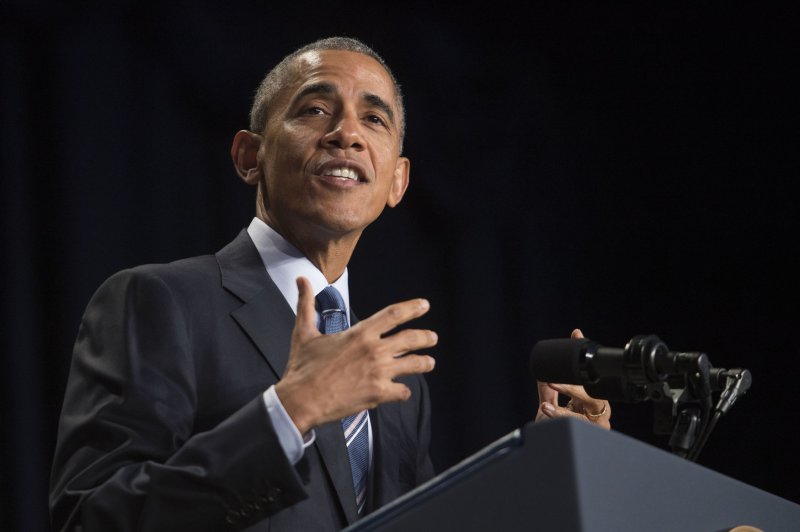President Barack Obama proposes a fee on oil that the industry says will hurt consumers. Some, however, see it as an opportunity to usher in a new era for U.S. energy. Pool Photo by Shawn Thew/UPI |
License Photo
WASHINGTON, Feb. 5 (UPI) -- Republican leaders in the U.S. House said a White House proposal to impose a $10-per-barrel tax on U.S. oil stands no chance of gaining legislative traction.
President Barack Obama proposed an additional fee on crude oil, calling for a $10-per-barrel tax to be phased in over five years to help fund new vehicle technology, rail initiatives and cleaner transportation systems.
U.S. Rep. Steve Scalise, R-La., said the proposal is indicative of the Obama administration's track record of enacting policies that hurt the nation's energy sector.
"He has waged open warfare on American energy," he said. "The House will kill this absurd proposal, and instead focus on lowering costs and growing our economy."
The White House said a new budget slated for congressional consideration would include the tax as part of an effort to spur investments and address chronic solvency issues in the Highway Trust Fund. The political appetite for such a tax may be influenced by the low price of crude oil, though retail petroleum analysts said the industry may not have much of an appetite for additional charges.
Retail gasoline prices have hovered under $2 per gallon in recent months, giving U.S. consumers a de facto stimulus. Patrick DeHaan, a senior analyst with retail market watchdog GasBuddy, said in response to email questions the $10 fee could trickle down to the consumer and add another 20 cents at least to the price of gasoline.
"It's certainly a very bold move by the White House, especially in an election year," he said. "As with almost every tax increase on fossil fuels, whether at the state or federal level, it will likely be completely passed to consumers in the years ahead."
For the first time in two decades, the United States has started producing more oil than it imports, though inventories continue to build, causing oil prices to decline. Industry group American Petroleum Institute said the consumer benefits of the U.S. oil production would be erased by the tax proposal.
"The White House thinks Americans are not paying enough for gasoline," API President and CEO Jack Gerard said in a statement.
The proposal does have its supporters. The non-profit Information Technology and Innovation Foundation said the funding would help support the advancement of autonomous vehicles, whose development could save the country an estimated $1 trillion per year and lead to widespread productivity gains.
On the environmental front, David Turnbull, a director with low-carbon advocacy group Oil Change International, the proposal could help usher in a new era for U.S. energy.
"While we await the full details of this new effort, Oil Change International applauds the Obama administration for thinking creatively about how we can transition off of oil and fund a new transportation paradigm for the United States," he said in a statement.















